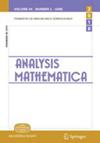Global Stein theorem on Hardy spaces
IF 0.6
3区 数学
Q3 MATHEMATICS
引用次数: 0
Abstract
Let \(f\) be an integrable function which has integral \(0\) on \(\mathbb{R}^n \). What is the largest condition on \(|f|\) that guarantees that \(f\) is in the Hardy space \(\mathcal{H}^1(\mathbb{R}^n)\)? When \(f\) is compactly supported, it is well-known that the largest condition on \(|f|\) is the fact that \(|f|\in L \log L(\mathbb{R}^n) \). We consider the same kind of problem here, but without any condition on the support. We do so for \(\mathcal{H}^1(\mathbb{R}^n)\), as well as for the Hardy space \(\mathcal{H}_{\log}(\mathbb{R}^n)\) which appears in the study of pointwise products of functions in \(\mathcal{H}^1(\mathbb{R}^n)\) and in its dual BMO.
哈代空间上的全局斯坦因定理
让 \(f\) 是一个可积分函数,它在\(\mathbb{R}^n \)上有积分 \(0\),那么保证 \(f\) 在 Hardy 空间(\mathcal{H}^1(\mathbb{R}^n)\)中的\(|f|\)的最大条件是什么?当 \(f\) 紧凑支撑时,众所周知,对 \(|f|\) 最大的条件就是 \(|f|\in L \log L(\mathbb{R}^n) \)。我们在这里考虑的是同类问题,但不需要任何支持条件。我们对 \(\mathcal{H}^1(\mathbb{R}^n)\) 以及 Hardy 空间 \(\mathcal{H}_{\log}(\mathbb{R}^n)\)这样做,后者出现在 \(\mathcal{H}^1(\mathbb{R}^n)\) 及其对偶 BMO 中函数的点异积研究中。
本文章由计算机程序翻译,如有差异,请以英文原文为准。
求助全文
约1分钟内获得全文
求助全文
来源期刊

Analysis Mathematica
MATHEMATICS-
CiteScore
1.00
自引率
14.30%
发文量
54
审稿时长
>12 weeks
期刊介绍:
Traditionally the emphasis of Analysis Mathematica is classical analysis, including real functions (MSC 2010: 26xx), measure and integration (28xx), functions of a complex variable (30xx), special functions (33xx), sequences, series, summability (40xx), approximations and expansions (41xx).
The scope also includes potential theory (31xx), several complex variables and analytic spaces (32xx), harmonic analysis on Euclidean spaces (42xx), abstract harmonic analysis (43xx).
The journal willingly considers papers in difference and functional equations (39xx), functional analysis (46xx), operator theory (47xx), analysis on topological groups and metric spaces, matrix analysis, discrete versions of topics in analysis, convex and geometric analysis and the interplay between geometry and analysis.
 求助内容:
求助内容: 应助结果提醒方式:
应助结果提醒方式:


